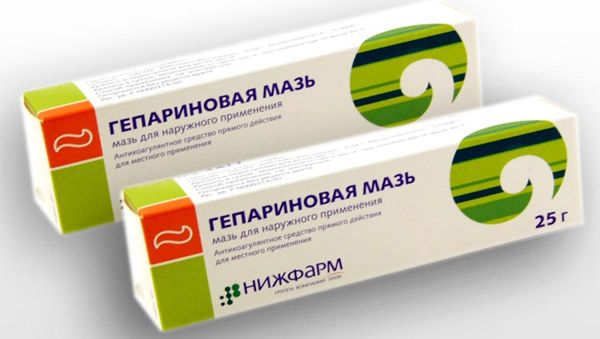
All iLive content is medically reviewed or fact checked to ensure as much factual accuracy as possible.
We have strict sourcing guidelines and only link to reputable media sites, academic research institutions and, whenever possible, medically peer reviewed studies. Note that the numbers in parentheses ([1], [2], etc.) are clickable links to these studies.
If you feel that any of our content is inaccurate, out-of-date, or otherwise questionable, please select it and press Ctrl + Enter.
Heparin ointment for acne
Medical expert of the article
Last reviewed: 03.07.2025
Acne on the body, and especially in the face area, is a big nuisance for a modern person. After all, today it is very important to have a presentable appearance. Specialists in the field of cosmetology have developed many skin care products. Among them, there is a special line that is designed to combat acne. It is worth noting that not all drugs are equally effective. In practice, it has been proven that Heparin ointment for acne gives an excellent result. It can be found in all pharmacies for a small price.
Indications for the use of heparin ointment
Heparin ointment is intended for the treatment of thrombophlebitis and varicose veins; external hemorrhoids; trophic ulcer of the leg; inflammation of the lymphatic vessels; in the formation of subcutaneous hematomas, edema; injuries and bruises; superficial mastitis. But at the same time, it has proven itself as a good remedy for acne.
Read full information about the drug here.
Pharmacodynamics
Heparin ointment for acne is a combination drug that is used on external areas of the body. The mechanism of action depends on the constituent components.

Sodium reduces inflammation, accelerates the process of thrombus resorption and forms a barrier to the formation of new ones. It has an inhibitory effect on hyaluronidases, activates the fibrinolytic properties of blood.
Nicotinic acid promotes dilation of superficial vessels to improve absorption of heparin.
Benzocaine reduces pain levels.
Pharmacokinetics
Heparin ointment is almost not absorbed into the blood and does not enter the circulatory system.
Heparin ointment for acne scars
It happens that after acne, marks remain on the body - scars, which significantly worsen the appearance. But this problem is solvable, it is enough to use a high-quality ointment. Do not look for such a remedy among expensive brands. Heparin ointment will help get rid of scars after acne. It is an antithrombotic and analgesic drug that effectively eliminates not only rashes on the skin, but also smooths out scars left by acne. The ointment has a detrimental effect on microorganisms and bacteria that provoke the inflammatory process, reduces pain in wounds caused by acne. Before use, it is necessary to do a test for an allergic reaction to avoid negative consequences.
How to use heparin ointment for acne
Before applying Heparin ointment to the inflamed area, this area of skin must be cleaned with an alcohol solution. Then apply it in a thin layer and rub in with gentle massaging movements. It is better not to touch healthy areas. The procedure should be repeated twice a day - in the morning and in the evening. As a rule, the duration of treatment is no more than ten days. During this time, it is better to avoid a large number of cosmetics so as not to overload the damaged skin.
It is very important to treat the problem comprehensively. Read also:
Using Heparin Ointment for Acne During Pregnancy
It is permissible to use Heparin ointment for acne by pregnant and lactating women. But only if there is a good reason for this, established by a doctor. Naturally, the expectant mother may experience pathological conditions that are eliminated by medication. She should not forget that it is strictly forbidden to use this drug, like other drugs, independently and without supervision. After all, she can harm not only her health, but also the future child.
Contraindications for use
It is better to refuse to use Heparin ointment if there is a high degree of susceptibility to its components, there are disorders in the blood clotting process, a diagnosis of "thrombocytopenia" has been established. It is prohibited to apply the drug to open bleeding wounds and with purulent discharge. During pregnancy and lactation, use only on the recommendation of a doctor.
Side effects
The side effect of Heparin ointment is manifested in the form of dermatitis, hyperemia, blisters, itching. Bleeding is possible, since the drug contains a component that dilutes the blood. If they occur, you must consult a doctor.
Overdose
Long-term use of Heparin ointment can cause hemorrhagic complications.
Interactions with other drugs
Heparin ointment is not prescribed together with non-steroidal anti-inflammatory drugs, thyroxine, antihistamines and tetracycline.
Storage conditions
Heparin ointment should be kept in a dry place where the air temperature is no more than +20°C. Avoid exposure to direct sunlight. Keep out of reach of children.
Best before date
36 months. After the expiration date, the drug is not recommended for use.
Attention!
To simplify the perception of information, this instruction for use of the drug "Heparin ointment for acne" translated and presented in a special form on the basis of the official instructions for medical use of the drug. Before use read the annotation that came directly to medicines.
Description provided for informational purposes and is not a guide to self-healing. The need for this drug, the purpose of the treatment regimen, methods and dose of the drug is determined solely by the attending physician. Self-medication is dangerous for your health.


 [
[